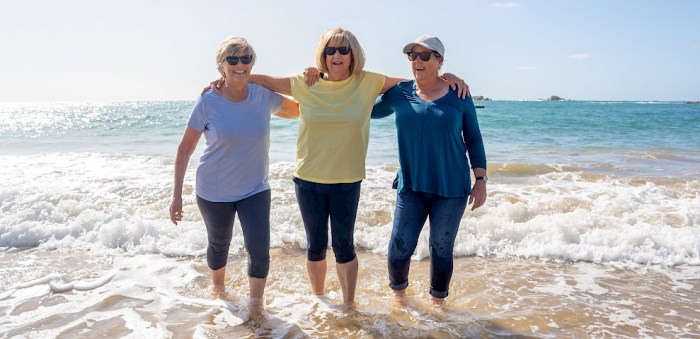Best Senior Travel Tours offer more than just vacations; they provide enriching experiences tailored to the unique needs and desires of mature travelers. This exploration delves into the key considerations for selecting the perfect tour, from accessibility and pace to destinations and activities. We’ll examine what constitutes a truly “best” experience, compare leading tour providers, and navigate the planning process to ensure a seamless and unforgettable journey.
From relaxing cruises to adventurous excursions, the options for senior travel are vast and varied. Understanding your personal preferences, physical capabilities, and desired level of activity is crucial. This guide will equip you with the knowledge to make informed decisions, ensuring your trip is not only enjoyable but also safe and comfortable. We’ll explore popular destinations, essential amenities, and practical tips for booking and planning your ideal senior travel adventure.
Defining “Best” Senior Travel Tours

Selecting the ideal senior travel tour requires careful consideration of several key factors beyond simply the destination. A “best” tour is one that seamlessly blends a stimulating itinerary with accommodations and logistical support tailored to the specific needs and preferences of older travelers. This involves a nuanced understanding of accessibility, pace, activities, and the overall travel experience.
Criteria for Selecting a Superior Senior Travel Tour, Best Senior Travel Tours
The definition of a “best” senior travel tour is inherently subjective, varying greatly depending on individual needs and preferences. However, several common criteria consistently emerge as crucial for a positive and enriching experience. Accessibility is paramount, encompassing ease of navigation at airports, hotels, and tour sites. This includes considerations such as wheelchair accessibility, ramps, elevators, and well-lit pathways.
The pace of the tour is equally important; a balanced itinerary avoids overwhelming seniors with excessive activity while ensuring sufficient stimulation and engagement. Activities should cater to diverse interests and physical capabilities, offering options ranging from gentle walks to more demanding excursions. Finally, the overall experience should be seamless and stress-free, with reliable transportation, comfortable accommodations, and attentive, knowledgeable guides.
Comparing Different Types of Senior Travel Tours
Senior travel tours cater to a broad spectrum of interests and physical abilities. Adventure tours, for instance, might involve moderate hiking and outdoor activities, best suited for active seniors with good mobility. Cultural tours focus on historical sites, museums, and local traditions, appealing to those interested in history and learning. Relaxation tours prioritize comfort and leisure, often featuring spa treatments, leisurely sightseeing, and ample downtime, ideal for seniors seeking a less strenuous experience.
Matching the tour type to the individual’s physical capabilities and interests is crucial for maximizing enjoyment and minimizing stress. For example, a senior with limited mobility might find a river cruise offering easy embarkation and disembarkation more suitable than a multi-day trekking expedition.
The Importance of Individual Health Conditions and Physical Limitations
Before booking any senior travel tour, a thorough assessment of the individual’s health conditions and physical limitations is essential. Pre-existing medical conditions, mobility issues, and any need for specialized medical equipment should be clearly communicated to the tour operator. This allows the operator to assess the suitability of the tour and make necessary accommodations. For instance, a senior with heart problems might need to avoid tours involving high altitudes or strenuous activities.
Similarly, a senior with limited mobility might require a tour with accessible transportation and accommodations. Ignoring these factors can lead to discomfort, health complications, and an overall negative travel experience.
Comparison of Popular Senior Travel Tour Providers
| Provider | Price Range (USD) | Itinerary Style | Customer Reviews (Average Rating) |
|---|---|---|---|
| Globus | $3,000 – $10,000+ | Guided, structured itineraries with diverse options | 4.5 stars |
| Viking River Cruises | $4,000 – $15,000+ | River cruises focusing on cultural immersion and relaxation | 4.7 stars |
| Abercrombie & Kent | $10,000 – $30,000+ | Luxury, bespoke itineraries with personalized service | 4.8 stars |
| Road Scholar (formerly Elderhostel) | $1,000 – $5,000+ | Educational and activity-focused tours for active seniors | 4.6 stars |
Note
Price ranges are estimates and can vary significantly based on the specific itinerary, duration, and time of year. Customer review ratings are averages from various online platforms and may fluctuate.*
Booking and Planning a Senior Travel Tour: Best Senior Travel Tours
Planning a senior travel tour requires meticulous attention to detail, ensuring a smooth and enjoyable experience. This process involves several key steps, from initial research to post-trip follow-up, each crucial for maximizing the benefits and minimizing potential complications. Careful consideration of individual needs and preferences is paramount.
Researching Tour Operators and Destinations
Selecting the right tour operator is the foundation of a successful trip. Thorough research is essential. Reputable operators specializing in senior travel often offer itineraries designed with the specific needs and physical capabilities of older travelers in mind. Consider factors like the operator’s reputation, customer reviews, and the level of support provided. Destination selection should account for accessibility, climate, and the type of activities offered.
For example, a tour focusing on historical sites might involve significant walking, while a cruise offers more relaxed mobility options. Comparing itineraries and pricing from multiple operators allows for informed decision-making.
Understanding Tour Itineraries and Inclusions
Carefully review the tour itinerary to understand the daily schedule, planned activities, and included services. This ensures alignment with personal preferences and physical capabilities. Pay close attention to details like transportation methods, accommodation quality, and meal arrangements. Understanding what’s included (and what’s not) avoids unexpected costs. For instance, some tours include excursions and entrance fees, while others require additional payments.
Clarifying these details upfront prevents misunderstandings.
Making Reservations and Securing Travel Insurance
Once a tour is selected, making reservations promptly is crucial, especially for popular tours that may fill up quickly. Provide accurate personal information and any necessary medical details. Securing comprehensive travel insurance is highly recommended. This protects against unforeseen events like medical emergencies, trip cancellations, or lost luggage. Consider policies that offer medical evacuation coverage and 24/7 emergency assistance.
A reputable insurance provider specializing in travel should be selected.
Reviewing Tour Contracts and Cancellation Policies
Before finalizing the booking, carefully review the tour contract. This legally binding document Artikels all terms and conditions, including payment schedules, cancellation policies, and liability clauses. Understand the cancellation policy thoroughly. Note any deadlines for cancellation and the associated penalties. For example, a cancellation close to the departure date might result in significant financial loss.
If unsure about any aspect of the contract, seek clarification from the tour operator before signing.
Communicating Specific Needs and Preferences
Open communication with the tour operator regarding specific needs and preferences is vital. This may include dietary restrictions, mobility limitations, or requests for accessible accommodations. Provide detailed information well in advance to allow the operator sufficient time to make necessary arrangements. For instance, informing the operator of a need for a wheelchair-accessible room or a gluten-free diet ensures these needs are met.
Proactive communication helps ensure a comfortable and enjoyable travel experience.
Pre-Trip, During-Trip, and Post-Trip Checklist
Effective planning involves a structured approach. A checklist ensures nothing is overlooked.
- Pre-Trip: Passport and visa verification; necessary vaccinations and medical consultations; packing appropriate clothing and medications; making copies of important documents; informing bank and phone providers of travel plans; arranging for pet care or house sitting.
- During-Trip: Staying hydrated; following the tour itinerary; maintaining communication with family/friends; carrying necessary medications and identification; being mindful of personal safety and belongings; taking precautions against theft and scams.
- Post-Trip: Submitting feedback to the tour operator; filing insurance claims if necessary; reviewing bank and credit card statements; organizing photos and mementos; sharing travel experiences with friends and family.
Post-Tour Reflections and Feedback

Sharing travel experiences and providing constructive feedback are crucial for refining senior travel tours and ensuring future travelers enjoy enhanced experiences. Senior travelers possess valuable insights gained from their unique perspectives and needs, making their feedback invaluable to tour operators. This feedback loop allows for continuous improvement, addressing potential shortcomings and highlighting aspects that resonate most with this demographic.Senior travelers can effectively share their experiences through various channels, significantly impacting the quality of future tours.
Utilizing Feedback Mechanisms
Tour operators often provide post-tour surveys, either via email or online platforms. These surveys typically include questions about various aspects of the trip, such as accommodation, transportation, activities, and overall satisfaction. Detailed responses, both positive and negative, help operators pinpoint areas for improvement. Direct communication with customer service departments allows for personalized feedback and immediate addressal of any concerns.
Furthermore, participation in online forums or social media groups dedicated to senior travel can provide a broader platform for sharing experiences and connecting with other travelers. Constructive criticism, focusing on specific incidents and suggesting actionable improvements, is particularly impactful. For example, feedback highlighting the need for more accessible transportation options or adjustments to activity pacing could directly influence future tour itineraries.
The Influence of Online Travel Reviews and Ratings
Online travel reviews and ratings platforms, such as TripAdvisor and Expedia, play a significant role in shaping the perception and booking decisions of future senior travelers. These platforms aggregate numerous reviews, providing potential travelers with a comprehensive overview of a tour operator’s strengths and weaknesses. Positive reviews detailing aspects like comfortable accommodations, engaging activities, and attentive guides can significantly boost bookings.
Conversely, negative reviews highlighting issues such as poor organization, inadequate accessibility, or unresponsive customer service can deter potential clients. The sheer volume and diversity of reviews, coupled with star ratings, provide a powerful mechanism for gauging the overall quality of a senior travel tour. The detailed narratives within reviews often provide specific examples, allowing prospective travelers to evaluate if a particular tour aligns with their needs and preferences.
For instance, a review mentioning the availability of accessible restrooms and ramps might be crucial for a traveler with mobility challenges.
Positive Travel Experiences and Well-being
Imagine a senior traveler, Margaret, embarking on a guided tour of Tuscany. The rolling hills, bathed in the warm Tuscan sun, paint a breathtaking panorama. The scent of sun-baked earth and freshly picked olives fills the air, mingling with the aroma of freshly brewed espresso from a local cafe. The sounds of lively Italian chatter, interspersed with the gentle strumming of a guitar in a nearby piazza, create a soothing ambiance.
The taste of authentic pasta, rich with tomato and basil, and the texture of crusty bread, perfectly complementing the local Chianti wine, are unforgettable culinary delights. The smooth, cool texture of the hand-painted ceramics she purchases in a charming village adds a tangible souvenir to her experience. This sensory richness, combined with the joy of exploring a new culture and connecting with fellow travelers, creates a profound sense of fulfillment and enhances Margaret’s overall well-being.
The memories forged during this positive experience provide lasting joy and contribute to her overall emotional and mental health, a testament to the power of enriching senior travel.
Ultimately, the best senior travel tour is the one that aligns perfectly with your individual aspirations and needs. By carefully considering factors like accessibility, pace, and desired activities, and by utilizing the resources and information provided here, you can confidently plan a trip that creates lasting memories and enhances your well-being. Remember, the journey itself is as important as the destination, so embrace the adventure and savor every moment.

